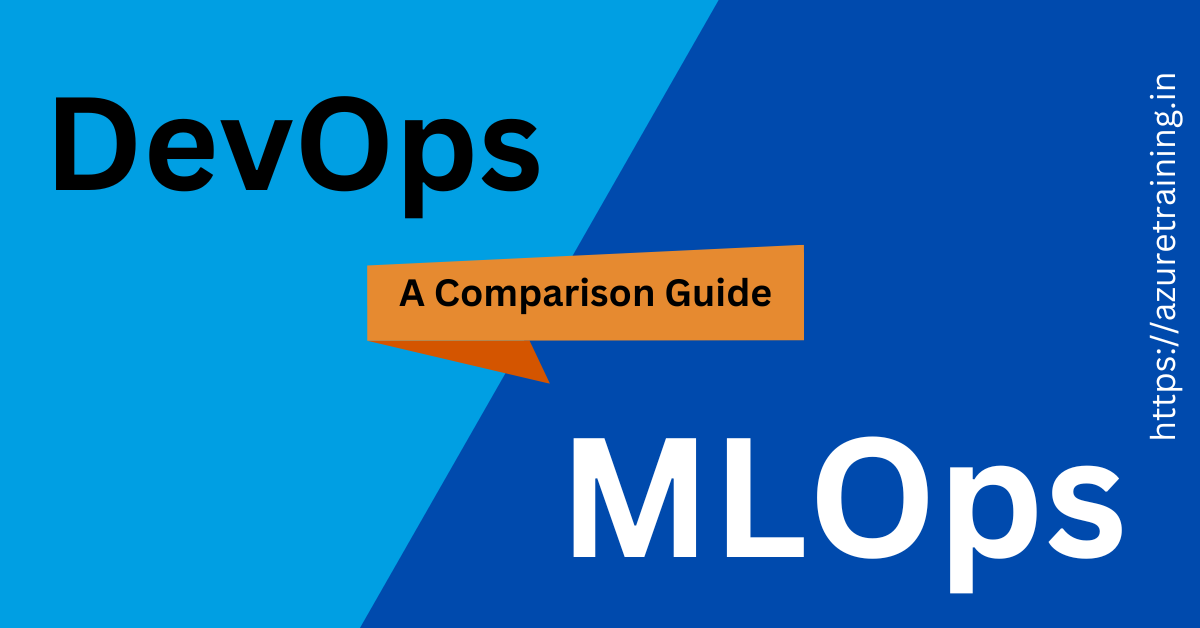A comparison between DevOps and MLOps
What is the difference between DevOps and MLOps?
| Aspect | DevOps | MLOps |
|---|---|---|
| Definition | DevOps is a methodology emphasizing collaboration and automation across development and operations teams. It aims to accelerate software delivery, implement continuous integration and delivery (CI/CD), and ensure continuous monitoring. | MLOps extends DevOps to address the unique challenges in the integration of machine learning (ML) and artificial intelligence (AI) into the development lifecycle. It focuses on the end-to-end ML lifecycle, covering model training, versioning, deployment, and ongoing maintenance. |
| Objectives | The primary objectives of DevOps are to enhance collaboration, automate processes, and achieve continuous software delivery, ensuring efficiency throughout the development lifecycle. | MLOps aims to improve the end-to-end ML lifecycle by addressing challenges specific to ML model development, deployment, and maintenance. It seeks seamless integration of ML models into production systems with a focus on versioning and reproducibility. |
| Processes | DevOps processes include version control, continuous integration, automated testing, and infrastructure as code (IaC). These practices contribute to a streamlined and consistent development environment. | MLOps processes encompass model training, evaluation, versioning, and deployment. Additionally, MLOps emphasizes the importance of model monitoring, retraining, and governance to ensure the effectiveness of ML models in production. |
| Tools and Technologies | DevOps relies on tools such as Jenkins, Git, Docker, Kubernetes, and Ansible to automate and orchestrate various aspects of the development lifecycle. Collaboration tools are also essential for effective teamwork. | MLOps utilizes tools like TensorFlow, PyTorch, MLflow, and Kubeflow to facilitate ML model development and deployment. Integration with existing DevOps tools is common to extend CI/CD pipelines for ML workflows. |
| Challenges | Challenges in DevOps implementation may include resistance to change, cultural barriers, and complexities in integrating diverse tools and processes. | MLOps faces unique challenges such as model versioning, reproducibility, and managing the iterative nature of ML model development. Addressing these challenges is crucial for successful deployment and maintenance of ML applications. |
| Collaboration | DevOps encourages collaboration between developers, operations teams, and other stakeholders to ensure a more efficient and reliable software delivery process. | MLOps promotes collaboration between data scientists, ML engineers, and operations teams. This collaboration bridges the gap between ML research and the deployment of models into production environments. |
| Lifecycle | DevOps covers the entire software development lifecycle, from coding and testing to deployment and maintenance, with a focus on continuous improvement. | MLOps extends the DevOps lifecycle to specifically address the phases of ML model development, deployment, and ongoing monitoring and maintenance. This ensures the effective integration of ML into the overall development process. |
How a DevOps Engineer can Transition to MLOps?
DevOps engineers possess valuable skills that are highly sought after in the growing field of MLOps. By leveraging their existing knowledge and acquiring additional expertise, they can successfully transition into MLOps roles. Here are some steps to make the switch:
1. Develop a foundational understanding of MLOps:
- Concepts: Familiarize yourself with the core principles and practices of MLOps, including model training, deployment, monitoring, and governance.
- Tools and technologies: Explore popular MLOps tools and technologies such as TensorFlow, PyTorch, Kubernetes, MLflow, Kubeflow, and Argo CD.
- Workflows and pipelines: Understand the different stages of the MLOps lifecycle and how to build automated workflows for model development and deployment.
2. Enhance your technical skills:
- Machine learning fundamentals: Gain a basic understanding of machine learning algorithms and concepts, focusing on supervised and unsupervised learning.
- Python programming: Deepen your Python skills, particularly in areas like data manipulation, libraries like Pandas and NumPy, and scientific libraries like Scikit-learn.
- Cloud platforms: Familiarize yourself with cloud computing platforms like AWS, Azure, and GCP, focusing on their MLOps services and offerings.
3. Build a portfolio of relevant projects:
- Contribute to open-source MLOps projects: This is a fantastic way to gain hands-on experience and showcase your skills to potential employers.
- Build your own MLOps project: Choose a problem you’re interested in and develop an end-to-end MLOps solution, including data preparation, model training, deployment, and monitoring.
- Participate in hackathons and competitions: These events provide a platform to practice your skills, collaborate with other MLOps enthusiasts, and gain valuable experience.
4. Network and build connections:
- Attend MLOps conferences and meetups: Connect with experts in the field, learn about the latest trends, and discover potential job opportunities.
- Join online communities and forums: Participate in discussions, ask questions, and learn from other MLOps practitioners.
- Connect with MLOps professionals on LinkedIn: Expand your network, seek mentorship, and learn from their experiences.
5. Highlight your DevOps skills:
- Emphasize your expertise in automation, CI/CD pipelines, and infrastructure management.
- Showcase your ability to collaborate with data scientists and machine learning engineers.
- Demonstrate your strong communication and problem-solving skills.
